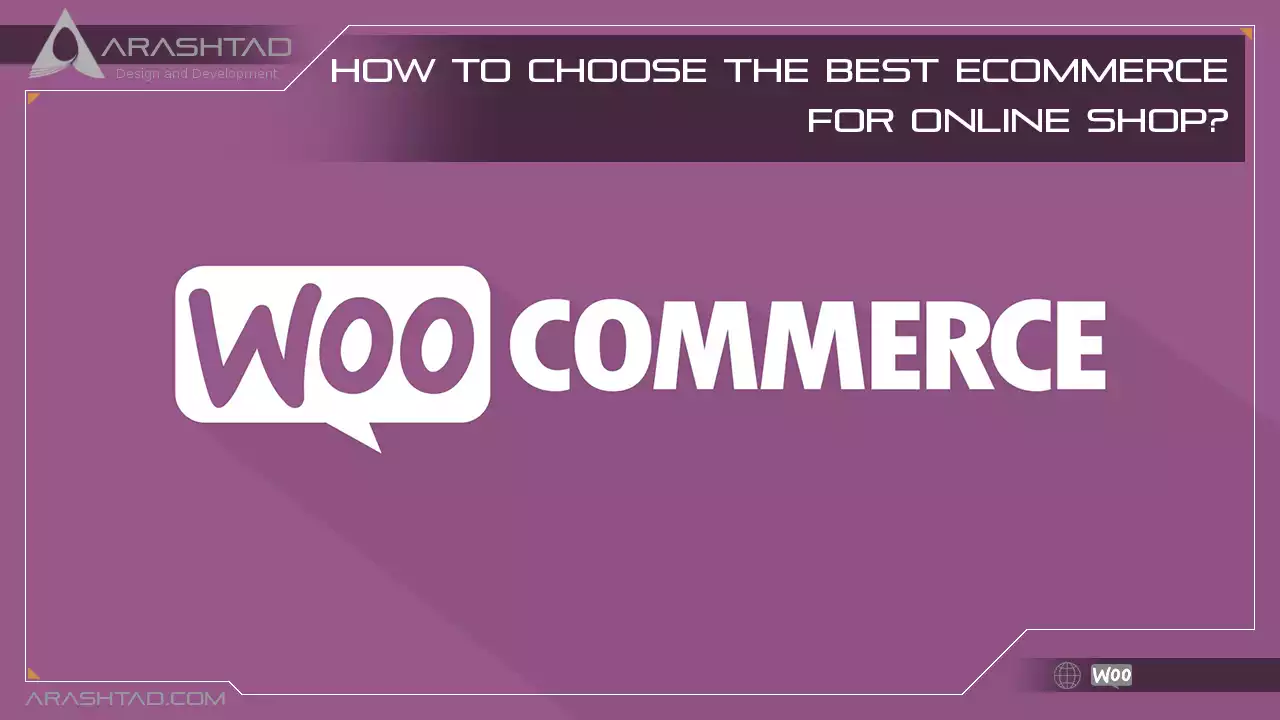How to Choose The Best eCommerce For Online Shop?
The two most popular eCommerce platforms are WooCommerce and Shopify. Both have their advantages and disadvantages. We will compare WooCommerce Vs. Shopify and show their differences so you can choose the best platform for your business. After reading this article, you can decide which e-commerce platform to choose based on your individual needs.
What is WooCommerce?
In recent years, WooCommerce has become one of the most popular eCommerce platforms in the world, used by millions of small and large businesses. A WordPress plugin called WooCommerce allows users to build an eCommerce website from scratch or add shopping cart functionality to an existing website using the most popular website builder on the market, WordPress. Since WooCommerce is open-source software, it is free to download and use. To set up a website, however, you still need a domain name and hosting web service, which costs money.What is Shopify?
How Should You Choose an eCommerce Platform?
Costs: Costs associated with starting an ecommerce store from scratch.
Payment: Multiple payment methods should be supported (such as PayPal, Stripe, and other merchant processors).
User-Friendly: A user-friendly interface should make the software accessible to anyone without previous experience.
Integrations: Your eCommerce business can grow through integrations with third-party tools and services.
Scalability: Your business should be able to grow with the platform.
To run a successful online store, all owners must take these basic requirements into account. In addition, you might also want to look into shipping, inventory management, invoicing, taxes, and dropshipping options, depending on your needs.
Cost: WooCommerce Vs. Shopify
The cost of starting an eCommerce website and its variable fees for add-ons and software should be considered by eCommerce website owners.WooCommerce
WooCommerce is an open source and free eCommerce plugin for WordPress.org (also known as self-hosted WordPress). However, the WooCommerce store requires a domain name, SSL Certificate, and WordPress hosting account. Domain names typically cost $14.99, SSL certificates cost $69.99, and web hosting costs around $7.99 / month. These are not cheap, especially when you’re just getting started.Many hosting companies now offer WooCommerce hosting plans, which significantly reduce costs. A free domain name, free SSL certificate, and a discount on web hosting are being offered by Bluehost, an official WordPress, and WooCommerce hosting provider. You can start your online store for as little as $2.75 a month with this service. It is also nice to note that WooCommerce doesn’t charge a percentage fee on transactions. As your online store grows, your hosting costs will also increase. WooCommerce costs start adding up with the purchase of paid extensions. In addition, there are often free alternatives to premium themes and paid extensions when using WooCommerce. It is also possible to control your costs by only purchasing tools and plugins as needed.
Shopify
You can start your online store with Shopify for only $29 per month, then upgrade to the Shopify plan for $79 or to the Advanced Shopify plan for $299 per month. It is necessary for you to purchase your own .com domain name separately. regular .com domain names generally cost $14/year. A payment service like Shopify Payments can also increase your costs; the basic plan costs 2.9% + 30 cents per transaction. For transactions processed via third-party payment gateways or your own merchant account, a flat fee of 2.0% will be charged. With Shopify Advanced, which costs $299 per month, you can reduce this fee to 0.5%. You can also add buy buttons to any site with the Shopify lite plan, which costs $9.00 / month. This plan also allows Shopify to be used for in-person sales in certain regions.Based on what we discussed, a basic WooCommerce store costs much less than a Shopify store.
Payment: WooCommerce Vs. Shopify
To accept online payments, there are many payment gateways available. some payment methods may not suit your business, and others may not be available to your customers.WooCommerce
The WooCommerce Payments solution is powered by Stripe and accepts PayPal and Stripe payments by default. Besides PayPal, it also supports all other popular payment methods. Many payment integrations are available, including those for Amazon Pay, Authorize.net, Square, Alipay, and many more. WooCommerce supports many regional and less popular payment gateways. Due to the lack of entry barriers, any payments company can create and support WooCommerce add-ons. A self-hosted platform charges only transaction fees to the payment gateway or bank. It’s important to note that WooCommerce does not charge a %fee on credit card payments unless you’re using WooCommerce Payments. Using WooCommerce will save you a lot of money if you prefer to use your own merchant account and third-party gateway.Shopify
Shopify offers a variety of payment options for customers when they check out. It includes its payments solution (powered by Stripe) along with all popular third-party payment gateways. There is a problem with Shopify charging an extra 2% fee for each transaction made through third party payment gateways. The payment gateway also charges transaction fees. With Advanced Shopify, you can reduce the cost by paying $299 per month to 0.5%. With Shopify Payments, you only pay fees on credit card transactions. Rates begin at 2.9% + 30¢ for the basic plan and get lower for other plans.User-Friendly: WooCommerce Vs. Shopify
Many people who start an eCommerce business don’t have experience with programming or web development. Choosing an easy-to-use platform has many advantages over paying someone a fortune to help them do basic things. If you can quickly make changes or fix issues, you have more time to focus on growing your business.WooCommerce
Since WooCommerce is not a hosted platform like Shopify, it requires you to install the WooCommerce plugin, monitor updates, keep backups, and ensure that your website is secure. You can automate many of these tasks with free and paid plugins. The WooCommerce platform is super flexible when it comes to customization. This platform is under your complete control. More than 59,000 WordPress plugins let you add any functionality you can dream of to your website.The only drawback is that there is no drag & drop design builder integrated. You can use one of the WordPress page builders like SeedProd or Beaver Builder by paying more.Shopify
Due to Shopify’s fully hosted platform, there are no installation, management, or updates necessary. Security, performance, backups, and compatibility issues are also not concerned. Upon signup, you can choose one of the many free Shopify themes. After that, you can customize it and add products. It’s easy to manage your product pages, sales, and inventory inside Shopify’s intuitive drag-and-drop interface. Guided, polished, and highly optimized user experiences can limit your control. In Shopify’s marketplace, you can select from the available add-ons or use the design and development tools provided by Shopify. However, many extensions and themes are available in Shopify, which are more than enough to get started and grow your online store for most users.Even though WooCommerce’s guided setup wizard is helpful, it is not as easy to use as Shopify’s onboarding experience.
Extensions and Integrations: WooCommerce Vs. Shopify
Despite the robustness of an e-commerce platform, it still requires third-party tools and services, such as email marketing software, lead generation tools, analytics tools, development services, etc., to grow your store.WooCommerce
Due to WooCommerce’s integration with WordPress, you have access to over 55,000 free and paid WordPress plugins. The chances are that there is already a plugin available that allows you to add contact forms, Google Analytics, lead generation forms, or anything else you can imagine. As a result of the lower entry barrier, WooCommerce offers many more integrations and add-ons than Shopify.Shopify
There are hundreds of apps available in Shopify’s app store, covering every feature you’ll want to add to your store. Shopify has a powerful API and an App Store you can use to purchase third-party add-ons. You can find free and paid apps in Shopify’s app store. Free apps are usually created by third-party services that charge fees and only integrate your store to their APIs. Due to the difficulty of getting an app listed in Shopify’s store, there are fewer add-ons and extensions for Shopify than for WooCommerce / WordPress.Scalability: WooCommerce Vs. Shopify
There are differences between Shopify and WooCommerce when it comes to scalability, but they are both capable of scaling to handle large volumes of traffic and orders.WooCommerce
There are many technical challenges with WooCommerce stores, but the good thing is that you have a lot more options to keep your costs low as you grow. There are several simple caching options you can implement, even if you are a beginner. These options will boost performance while keeping server resources low.Taking your website to a managed WordPress hosting provider like WPEngine or Liquid Web will allow you to easily scale it to meet your business’s needs. While WooCommerce offers a great deal of control, some small businesses prefer an easier way to manage their online stores.Shopify
When your business starts growing, you can upgrade your Shopify plan since Shopify handles the technical parts of your store. You don’t have to worry about downtimes, backups, updates, or security with their infrastructure. Shopify Plus plan also offers enterprise services. In addition to removing the painful part of growth, it also increases your cost of doing business. It will cost you more, and you’ll have to plan accordingly, but the good news is you won’t need to hire or manage a technical team.Which is Best? WooCommerce or Shopify
It truly comes down to your own personal preferences and skills whether you choose Shopify or WooCommerce as your eCommerce platform. There is a lot more ease of use with Shopify. A major benefit of Shopify is that you don’t have to install anything, and you can get started quickly. Setting up payments is easy, and the pricing plans are straightforward. A disadvantage is that you don’t have complete control. There are no upgrade options for select plans, and you cannot manage costs based on your growth. Transaction fees, add-ons, and integrations can drive up costs. You can get full control of your website with WooCommerce because it is open source; the cost of starting an online store with WooCommerce is much lower, especially when using these WooCommerce hosting companies. There is a disadvantage to maintaining the software. It has a bit of a learning curve, but millions of beginners use it already, and they get over it pretty quickly after the initial learning phase.Final Thought
In this article, we discussed WooCommerce and Shopify as two top eCommerce platforms in the world, each with its pros and cons. WooCommerce is the best platform if you want complete control over your online store, and Shopify is the best if you want something that is completely hassle-free and can be scaled infinitely.Download this Article in PDF format

Arashtad Custom Services
In Arashtad, we have gathered a professional team of developers who are working in fields such as 3D websites, 3D games, metaverses, and other types of WebGL and 3D applications as well as blockchain development.
Arashtad Services
Drop us a message and tell us about your ideas.
Fill in the Form
Blockchain Development



